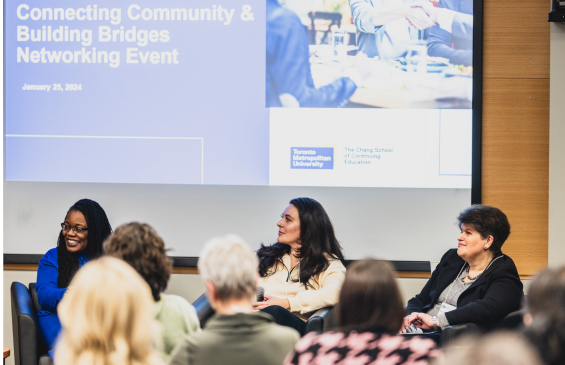How to Develop Your Unique Selling Proposition to Get You the Career You Love
May 23, 2024
In a competitive job market, finding a way to distinguish yourself from other candidates in more ways than just what’s on your resumé is crucial to getting a career you love. While it helps to have the most up-to-date skill set to match what employers are looking for in your field, an effective way to stand out from the competition is by developing a “unique selling proposition” or USP.
If you’re not familiar, the term USP was born out of brand marketing as a way for brands to differentiate themselves from their competitors as they compete for consumers’ attention. The same can be said for people marketing themselves when it comes to their career. The concept of “personal branding” is well known when talking about how you show up in the workplace – and having a USP is a foundational building block to developing your unique brand.
So, before we begin talking about how to define your USP, first off we need to understand what a USP is as it relates to your career. A USP for marketing yourself is similar to marketing a business – it’s what makes you unique, valuable, and desirable but instead of to consumers, it’s to employers. Think about what combination of skills, experiences, qualities, and attributes sets you apart from other candidates who are vying for the same role – whether it’s in your current company, industry, or something else altogether.

Career and Leadership Coach Ibiyemi Balogun who also holds an MBA from Ted Rogers School of Management at TMU
Instead of trying to come up with something on the spot, start by asking yourself these questions below.
What Are Your Skills and Talents?
If you’re looking to make a career pivot or go for a promotion, one of the driving forces behind that is often the need to align your work life with your self-concept or identity. In order to define that, you need to have a grasp on what your skills and talents are. This might seem easy at first, but we often overlook our own strengths because they come so naturally that we don’t realize they’re valuable skills.
Ibiyemi advises people to start by asking friends and family what they think they’re good at.
“Take your friend group for example – are you the one that people can count on to make plans or are you the one that’s the life of the party or are you the caring one?,” she says. “Even in just your personal life, you can find strengths that you can translate into your professional life.”
Another way to identify your strengths, according to Ibiyemi, is to review the feedback you receive from colleagues and managers.
“I remember getting feedback that said, ‘You’re really good for all seasons’. I was just like, ‘What does that even mean?’ My boss at the time explained that I’m able to hold my own in a room full of high school students the same as a room full of CEOs.”
“What he was basically saying is that I’m a very relatable person. I had heard that my whole life but never really saw it as a strength. It wasn’t until my boss pointed it out and put it into the context of work that I was able to identify it like that.”
Apart from what others say about you, Ibiyemi also says it’s a good idea to document your entire day when you’re on the job. At the end of the day, take a look at what you’ve written and identify the times when you were “in a flow”, meaning that you were so engrossed in your work that you lost track of time.
“You’re embedded in the work you’re enjoying – those are your strengths,” she says. “Also, the things that come easy to you on your to-do list are also your strengths.”
Knowing your strengths is starting to scratch the surface of developing your USP that builds the foundation for your personal brand. The next question takes it to a deeper level.
What Are Your Passions and Interests?
Now that you’ve identified your strengths, it’s time to think about your passions and interests. But where do you start?
When you were the ages of zero to 20, what did your mom, dad, brother, sister, extended family, or other caregivers and role models like teachers or friends say you were good at or interested in? Were you the type of kid that read every book in the library or did you run further and faster than anyone else your age?
Your passions and interests that were with you from a young age can help you form your personal brand. While an employer won’t necessarily care that you won the 100 metre race when you were in school, they will care that your competitive nature strives you to do the very best you can and give it your all when you’re on the job.
While it's important to consider your interests, simply having a passion for something and low skill in the area won't help you in the workplace. The opposite can also be true; focusing solely on your current skills could lead you down a career path that lacks fulfilment.
“No one will hire you because you’re interested in writing books but you actually aren’t a very good writer,” says Ibiyemi. “On the flip side, if you have a high ability in something but have zero interest in it, you’re going to be miserable.”
Ibiyemi added that post-pandemic, people are especially re-evaluating their career choices and whether it brings them true happiness so this is a career reflection that can’t be overlooked.
What Are Your Unique Experiences?
Here’s another question where your answer won’t necessarily translate well into a job interview but does matter to developing your USP and overall personal brand.
While your unique experiences or things you pursue might not be of interest or relevant to the job, they might just put you in touch with the connections you need to get the career you love. However, this is more of a slow burn and takes time to develop naturally – it can’t be forced and won’t work in a formal setting like a job interview.
“You’ve got to be able to share these stories more informally in a networking type of setting or by posting and documenting those stories on LinkedIn. If someone resonates with it, it will be a point of connection to cultivate a professional relationship that can lead to a job,” says Ibiyemi.
She adds that she had once shared a post about her solo travel and her trip to Kenya, which sparked interest of other travellers and opened up conversations with potential coaching clients.
What Skills and Experiences of Yours Align With Industry Trends?
Knowing how your skills and experience align with key industry trends will give you a unique perspective.
Ibiyemi recommends signing up for relevant industry specific newsletters as they are highly curated with industry insights that will keep you in the know. For instance, if you are in the tech space, there are newsletters that provide weekly news about tech companies who are in series A and B funding rounds, companies that are hiring, news about IPOs, and much more.
“You spend enough time just trying to get your work done. Realistically, you don’t have time to spend doing research on what’s going on in your industry,” she says. “Leave that to the people that are putting together the information you need in a newsletter.”
Ibiyemi says she also regularly filters her LinkedIn newsfeed so the posts she sees are relevant to her industry.
Put It Down on Paper, Spread the Word, and Evolve!
Now that you’ve developed your USP, it won’t get you anywhere unless you can craft the perfect “elevator pitch” to sell your personal brand to get the career you love.
Ibiyemi says crafting the perfect summation of your USP is down to three things: who you are, what you’ve done, and what you’re looking for. That should all come pretty easy if you’ve put in the work above.
The “who you are” bit is about your education and professional background whereas what you’ve done is about your strengths and experiences. What you’re looking for is what inspired you to have the conversation with the employer right now for that particular job or your career.
Here’s an example of how it might look:
“Hello, my name is Toby, I'm a software engineer with four years creating reusable dashboards for tech startups in the healthcare space. I'm currently looking to transition into the dental space, would you have any leads I can explore?”
And coming up with your USP is not a “one and done” thing – it takes work to constantly evolve it and add to it new strengths and skills you’ve acquired, new experiences you’ve had and things you’ve learned along the way.
Doing this takes time and is an investment in yourself – but if you want a career you love, then it’s worth the effort.


